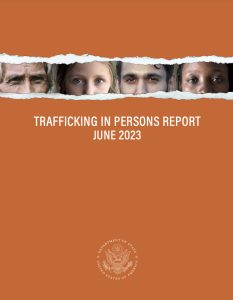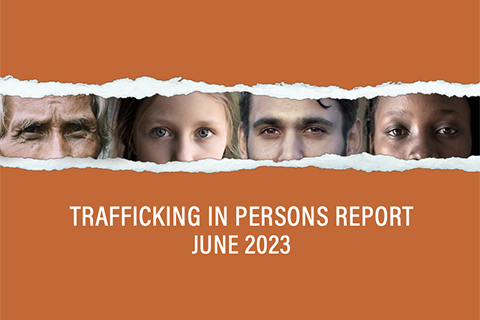 Today, the U.S. Department of State released the 2023 Trafficking in Persons (TIP) Report. The TIP report, mandated by the Trafficking Victims Protection Act of 2000, has been a critical tool in identifying global trends in forced labor and human trafficking, reinforcing U.S. policy to combat trafficking and highlighting the importance of survivor leadership in effectively addressing this issue. The report has also been a vehicle for holding governments accountable for their policies and efforts to prevent and respond to human trafficking.
Today, the U.S. Department of State released the 2023 Trafficking in Persons (TIP) Report. The TIP report, mandated by the Trafficking Victims Protection Act of 2000, has been a critical tool in identifying global trends in forced labor and human trafficking, reinforcing U.S. policy to combat trafficking and highlighting the importance of survivor leadership in effectively addressing this issue. The report has also been a vehicle for holding governments accountable for their policies and efforts to prevent and respond to human trafficking.
This year’s report highlights the importance of “strategic, multi-disciplinary” partnerships in effectively combating human trafficking. We agree that strong coordination within government agencies and partnerships between a diverse group of stakeholders enhances the ability for stronger prevention, protection, and prosecution. Humanity United welcomes the State Department’s continued emphasis on prioritizing the needs and voices of survivors and those with lived experience in this year’s report.
On the TIP Report country rankings, Humanity United agrees with Qatar’s Tier 2 designation. Indicators of forced labor, such as non-payment of wages and wage theft, remained rampant across the country for migrant workers throughout the past year. In fact, non-payment of wages was the primary complaint reported to Qatar’s Ministry of Labour in 2022. Further, despite the opening of the first government-run shelter for migrants last fall, Qatar continues to have gaps in service provision and protection for survivors of human trafficking, especially female migrants and domestic workers who are at particularly high risk of abuse. This ranking, paired with the U.S. Department of State’s identification of “credible reports of… restrictions on migrant workers’ freedom of movement, access to justice, and vulnerability to abuses, including forced labor” highlights the pervasiveness of the problem and the need for concrete action by the government of Qatar.
Conditions that contribute to forced labor and human trafficking, like corruption, have also prevented progress toward meaningful reform and remedy for workers in Qatar. Recent allegations of bribery to quiet reports of labor abuse and shape public opinion within Europe prior to the 2022 FIFA World Cup reaffirm this fact. Meanwhile workers, unions and civil society organizations continue to call on the Qatari government to make good on their commitments to truly hold employers accountable and provide meaningful remedy to workers, particularly in light of reported backsliding on the implementation and enforcement of its labor laws.
We were disappointed with Thailand’s Tier 2 ranking. While the government of Thailand has enacted reforms and displayed signs of progress since 2014, it has not taken sustained efforts in recent years to address severe forms of trafficking during the reporting period. Although progress has been made, labor trafficking, which has been documented by workers, unions, and civil society organizations, continues to be a feature of the Thai seafood industry. Fish and shrimp produced in Thailand continues to be listed on the U.S. Department of Labor’s (DOL) List of Goods Produced by Child Labor or Forced Labor. Notably, migrant workers commonly face exploitative recruitment practices and limited if any legal protections, in large part due to Thai laws that prevent migrant workers from forming and leading unions. Thailand has demonstrated a waning commitment to continued progress in recent years and the new Thai government has an opportunity to garner and reignite the political will to prioritize additional critical reforms and ensuring that further backsliding does not occur.
Taiwan’s seafood industry is similarly impacted by human trafficking and forced labor, and we are disappointed by its Tier 1 ranking. The government of Taiwan has taken steps to address trafficking, but these measures do not fully meet the minimum standards for the elimination of trafficking. Despite some efforts by the Taiwanese government to improve conditions on its distant water fleet, inspections remain inadequate, and we agree with the recommendation to increase inspections of vessels suspected of using forced labor. Workers in the seafood industry continue to face significant barriers to decent work due to the lack of effective policy implementation and enforcement actions. Specifically, workers continue to be subject to exploitative recruitment fees which are deemed legal under Taiwanese law and can leave workers in conditions of bonded labor. Additionally, workers often have their salaries withheld from their employers or recruitment agencies due to poor regulation by the Taiwanese government. Taiwan-caught fish also continues to be listed on the DOL List of Goods Produced by Child Labor or Forced Labor.
Finally, the 2023 TIP report ranks the United States at Tier 1. While the United States has made policy reforms to keep goods made with forced labor out of U.S. supply chains, there are areas where the government can still improve. Numerous reports of forced child labor within U.S. factories and other poorly regulated jobs throughout 2022 demonstrate that the U.S. government has thus far failed to act on multiple warnings of these conditions. Although there are no recommendations that would specifically address these and other similar offenses, several of the report’s suggestions could help protect migrant children from exploitation.
The report also acknowledged the need to address criticism by civil rights advocates that the U.S. does not adequately support Black and Brown victims of trafficking, whom advocates say are often treated as criminals themselves.
The U.S. government must more effectively enforce and implement its existing policies, including but not limited to increasing the issuance of Withhold Release Orders and prosecuting the perpetrators of trafficking.
We continue to assert that the credibility and effectiveness of the U.S.’s efforts to hold other countries accountable through tools like the TIP report depend on the U.S. government’s own progress toward combatting human trafficking.

 Today, the U.S. Department of State released the
Today, the U.S. Department of State released the